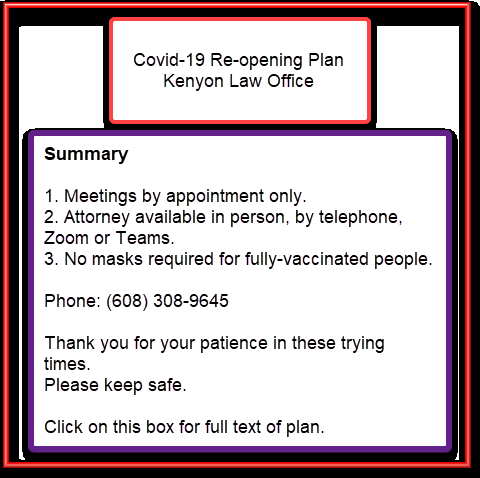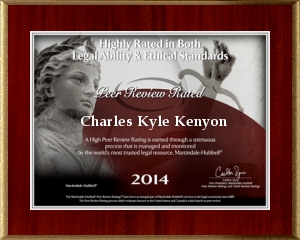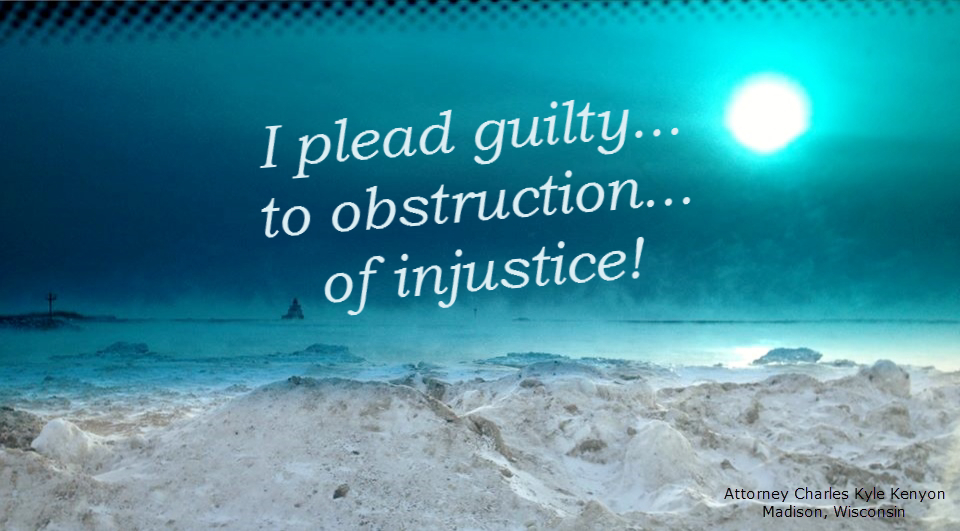The police can stop a person when they have good faith belief that the person was involved in a crime – If a "pat-down" search is involved, this is often referred to as a “Terry Stop.” However, under the Fifth Amendment right against self-incrimination, a person does not have to answer any questions. In fact, a person should not answer any questions during a “Terry Stop.” The law only requires a person to give his name, date of birth, address and other information to establish identity if requested. Therefore, if questioned about a crime when walking on a street, do not utter any words accept your name. Respectfully, inform the officer that you are exercising your Fifth Amendment Constitutional Rights and wish to remain silent. See Miranda Rights - and wrongs - thoughts and links. After a short time, ask if you are free to go on your way.
What about when I'm driving? See Drunk Driving Stop in Wisconsin
Do police have to give Miranda warnings when making an arrest?
This is a concept that is often misunderstood by clients. No, the police do not need to give the Miranda warnings when making an arrest. Miranda warnings are required only when the police interrogate a person after an arrest. Miranda warnings are also not required when the police interrogate someone prior to an arrest however, everything that you say to the police at any point in time can be used against you. See Miranda Rights - and wrongs - thoughts and links.
You have rights. The police are supposed to tell you some of them. Sometimes they will. If they don't it does not usually mean that you won't get charged or convicted; it means they didn't read you your rights. If they do read you your rights, take it seriously. Make them take it seriously. Ask for a lawyer. Refuse to answer questions. (Don't just remain quiet, actively say "I don't want to talk with you." or "I refuse to answer any questions.")
Do the police need a warrant to make an arrest?
If the police have “probable cause,” a reasonable suspicion that a person has been committed a crime, it is unnecessary for them to obtain a warrant before arresting someone. However, police must obtain a warrant when arresting a person in his home if it is for a non-serious offense and there is no belief that the person will destroy evidence. The arrest warrant must provide evidence that a crime has been committed, that the person names on the warrant committed the crime and the warrant must comply with all rules of court.
Will my case be dismissed since the police questioned and arrested me without giving a Miranda warning?
No, not if they have evidence other than your statements. The prosecutor can still bring charges against you even if the police failed to give Miranda warnings before conducting a police interrogation. The failure to Mirandize a suspect after arrest and prior to interrogation prevents the prosecutors from being able to use any evidence obtained via the interrogation against the suspect at trial. But the prosecutor can use evidence obtained via another means to secure a conviction. They can also use your illegally obtained statements against you in court for some purposes.
If I agree to police questioning, can I later decide not to answer questions?
Yes, Miranda warnings give a person the right to stop a police interrogation at any time even if he has already waived his right to remain silent and answered some questions. A person can exercise this right by refusing to answer any more questions or requesting an attorney. Once a person avers Miranda rights, the police must discontinue the interrogation. Again, if you want, you can stop the questioning at any time.
What tactics can the police use when questioning a suspect?
Law enforcement is forbidden from using physical or psychological coercion when conducting police interrogations. However (I wish that everyone understood this) the police can lie, trick and employ other types of non-coercive methods to obtain a confession from a suspect. Police are trained in interrogation techniques. They are trained to make false promises and use scare tactics. Many people have been convicted because of statements given to police even though innocent.
Types of things the police might tell you to get you to talk to them:
- "If you don't answer my questions, I'll have no choice but to arrest you. Do you want to go to jail?" (They will arrest you either way.)
- "You're not a suspect - just help us understand what happened here and then you can go." (They will arrest you after you talk.)
- "If you don't answer my questions, I'm going to charge you with resisting arrest." (They will arrest you either way)
- "All of your friends have cooperated and we let them go home. You're the only one left." (They will arrest you either way.)
- "You are just here voluntarily and we appreciate you helping us with this. You are free to leave at any time." (If you try to leave, they arrest you.)
Cops are sneaky and there are lots of ways they can trick you into talking. They are allowed, even trained, to lie to you. Here are some cons they'll pull:
- Good Cop/ Bad Cop: Bad cop is aggressive and menacing, while good cop is nice, friendly, and familiar (usually good cop is the same race and gender as you). The idea is bad cop scares you so bad you are desperately looking for a friend. Good cop is that friend, until you are done talking.
- The cops will tell you that your friends ratted on you so that you will snitch on them. Meanwhile, they tell your friends the same thing. If anyone breaks and talks, you all go down.
- The cops will tell you that they have all the evidence they need to convict you and that if you "take responsibility" and confess the judge will be impressed by your honesty and go easy on you. What they really mean is: "we don't have enough evidence yet, please confess."
- The cops may show you something and claim it is your fingerprints, or tell you they have your fingerprints.
- The cops may tell you that they have you on video committing a crime. There may or may not be a video. It may or may not be someone who looks like you.
Even if the cop questioning you is completely honest, he/she is human, and hears what he or she expects to hear. Jail is a very isolating and intimidating place. It is really easy to believe what the cops tell you. Insist upon speaking with a lawyer before you answer any questions or sign anything.
Do the police have the right to take a bodily sample without permission?
Yes. Your right against self-incrimination applies to communication and does not prohibit the police from collecting physical bodily evidence, i.e. blood samples, hair samples… They may need a warrant to do this, though.









